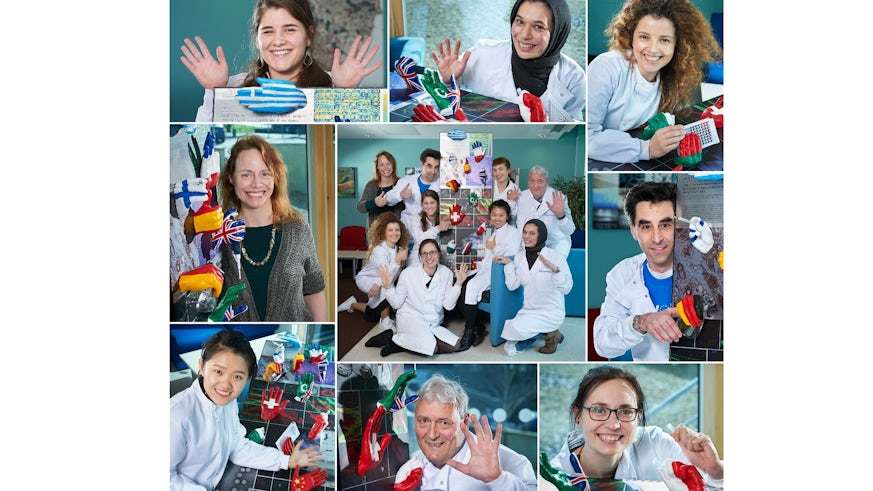Science is International
27 March 2017

Artwork by Cardiff immunologists celebrates the international nature of research
Science is not generally a solo effort by a single genius, but a collaborative effort requiring many hands and minds all working towards a common goal. Productivity and quality are greatly enhanced by having people of different mindsets and backgrounds who bring unique abilities to the team and address scientific questions in different ways. For this reason, UK science has always been a place which has welcomed contributions of researchers from across the globe.
Film looking at the artwork and those involved
A highly original three-dimensional artwork by Dr Simone Twohig illustrates the international nature of research. It shows a tiny fraction of the diverse people who study and work at Cardiff University, and the amazing findings that they produce.
These are the hands that conduct the world-leading research that contributes to the UK's wealth and health.
Each hand was lifecast from individual scientists and post-graduate students who are actively researching medical questions at Cardiff University. The hands were been painted in the flags of the researchers’ country of origin and mounted on a backboard showing the fruits of their research, which spans cancer, diabetes, autoimmunity and infection.

"This artwork is a glorious representation of the importance of having many hands joining forces to do great science, and the need to ensure that the UK government support scientists in putting in place a positive roadmap to ensure collaboration can continue across the EU post Brexit."
The international nature of science is apparent from the observation that UK scientists travel widely, with 72% of UK researchers spending time at a non-UK institution between 1996 and 2012, according to evidence collected by the British Society for Immunology.
The latest figures reveal that approximately 28% of academics at UK universities are from outside the UK; in Biomedical Sciences this ratio of international staff is even greater. For instance, 40% of scientists at the Francis Crick Institute in London, the biggest biological laboratory in Europe built at a cost of £700m, are non-UK Europeans.

"What I enjoy most about my work, professionally and personally, is the international nature of scientific research. Over the past 20 years I have worked in Germany, Switzerland and the UK alongside lab members with more than 20 different nationalities, and I have co-authored articles with scientists from 70 different institutions all over the world."
Share this story
Our systems biology-based research informs the development of novel diagnostics, therapies and vaccines against some of the greatest public health threats of our time.
